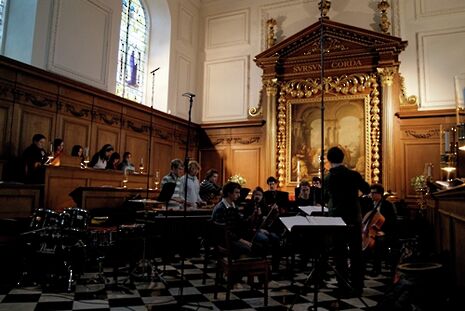Classical: Nauset

Nowset, Noorset; Nowsay, Noorsay? Speculation as to the pronunciation of Music finalist Joel Rust’s new chamber opera had been growing all week. Fortunately Rust’s librettist, David Troupes, not a fellow student but a part-time poet/social housing officer, was on hand at this weekend’s performances to enlighten us: it’s very much Nowwwset, after the Cape Cod Bay in Troupes’ native Massachusetts. Unfortunately, though, Troupes isn’t a born performer, and even with the fine acoustics of Emmanuel College Chapel, his pre-show poetry reading and description of the libretto reached only the keenest audience members seated in the front pews.
It’s hard to say whether the three singers – Joanna Songi as confused daughter, Louise Kemeny as grieving mother and Edward Leach as drowned husband – are natural performers either. Songi and Kemeny were left to recite their soliloquies from the confines of the back row of pews, penned in by hymnbook holders, whilst Leach appeared to be trapped behind a music stand. There was none of the movement and spectacle which we’ve come to expect from opera.
Yet, there’s certainly room and – judging by the audience’s post-analysis on Saturday – demand for further development of the work. And the singing was promising. Songi’s soprano is ideally suited to Rust’s spectral writing: her mourning for the washed-away father could have continued for the entire opera and the audience would have remained just as awestruck. Leach too, blessed with the opera’s lone morsel of stage direction, was impressive, although his tenorific top notes proved punchier than his lower register. Unfortunately Kemeny’s diction failed to give Troupes’ libretto the full exposure its beauty deserved, her declamation resembling little more than a frothy wash. But with expansion, it would be interesting to see how the opera translated beyond the confines of a college chapel, which ultimately imposed severe limits on performance – candle holders are hard to disguise.
Praise too must go to conductor Christopher Stark and his players for their musical personification of the lapping sea. Rust’s instrumental interludes, redolent of Peter Grimes’ (another sea-obsessive opera) watery scapes, were narrated with a virtuosic intensity by the bassoon player and cellist, and the three percussionists’ 12-pronged marimba summoned a sonorous rippling ocean, complete with grating pebbles at the shore. While some might accuse Nauset’s creators of false advertising in their marketing of the project as an opera - its distinct lack of theatrics forcing stand-and-deliver renditions from the singers - Rust’s 45 minutes of music in homage to, or in bewilderment at, the wonder of the sea is certainly dramatic stuff. When Stark’s hands lowered after the final wail from his orchestra, the quiet was absolute: the words pin and drop come to mind. No one wanted to begin the applause that singers, players and creators alike undeniably deserved, for fear of breaking the mood of sea-salted contemplation.
 Comment / Anti-trans societies won’t make women safer14 November 2025
Comment / Anti-trans societies won’t make women safer14 November 2025 News / Controversial women’s society receives over £13,000 in donations14 November 2025
News / Controversial women’s society receives over £13,000 in donations14 November 2025 News / John’s rakes in £110k in movie moolah14 November 2025
News / John’s rakes in £110k in movie moolah14 November 2025 Fashion / You smell really boring 13 November 2025
Fashion / You smell really boring 13 November 2025 Music / Three underated evensongs you need to visit14 November 2025
Music / Three underated evensongs you need to visit14 November 2025









